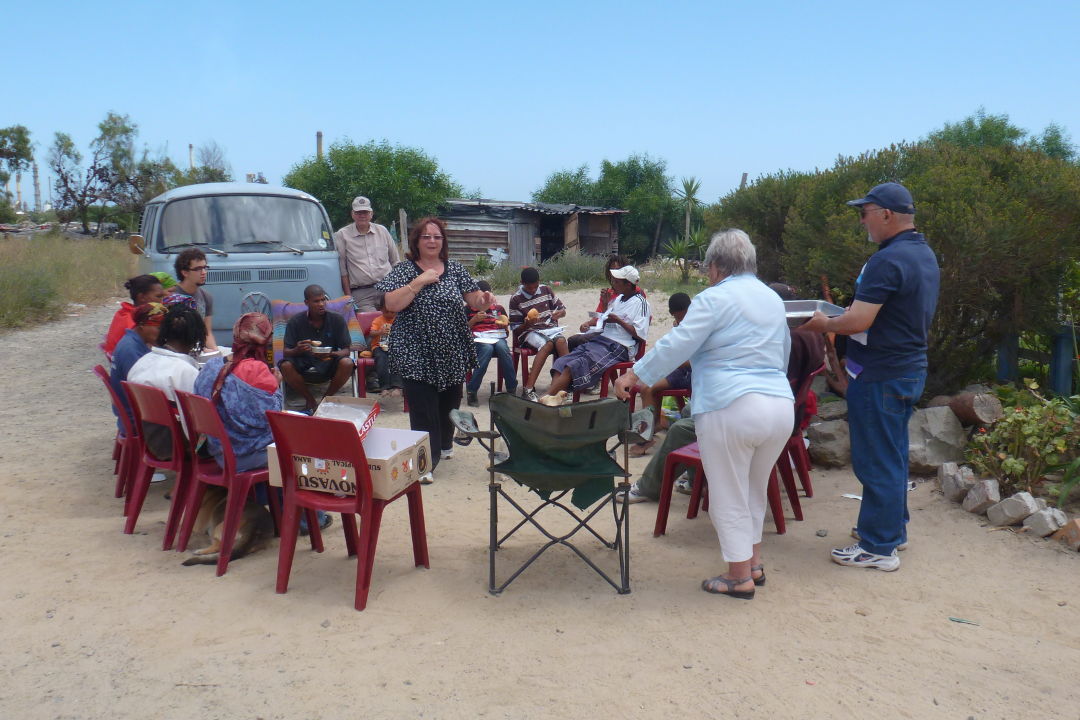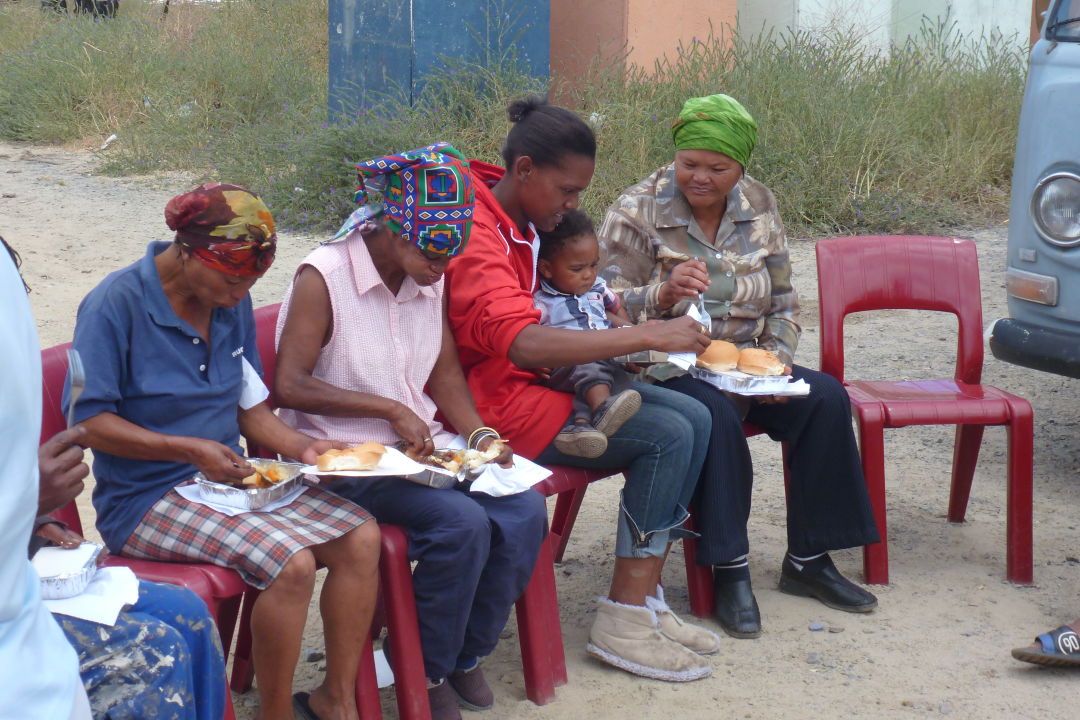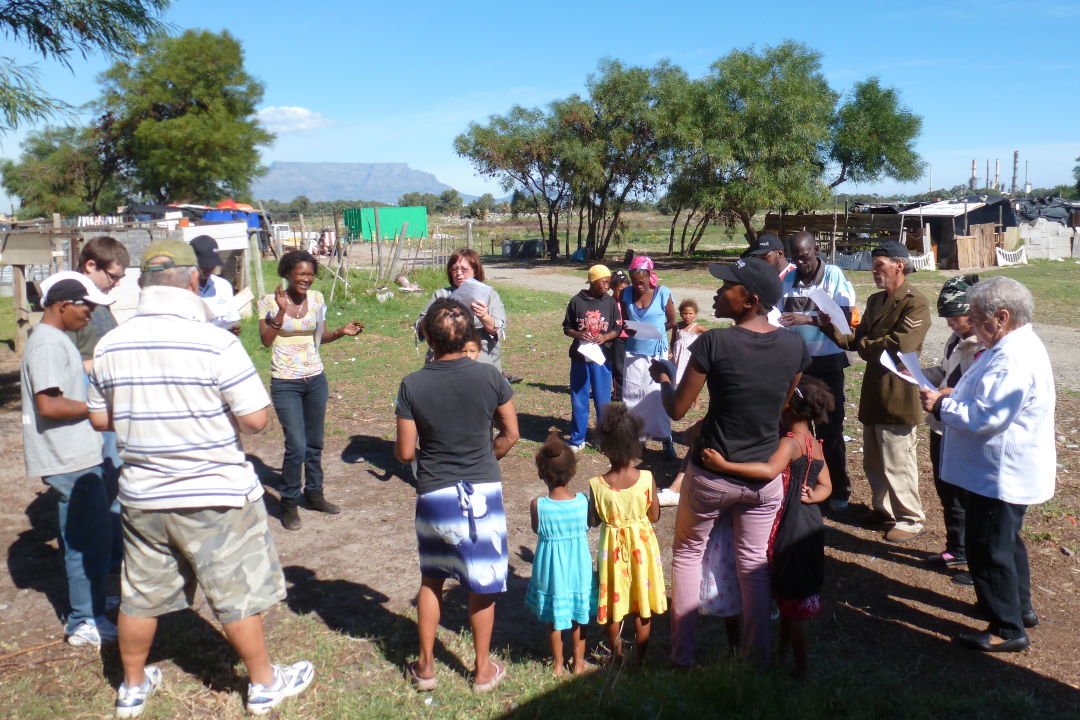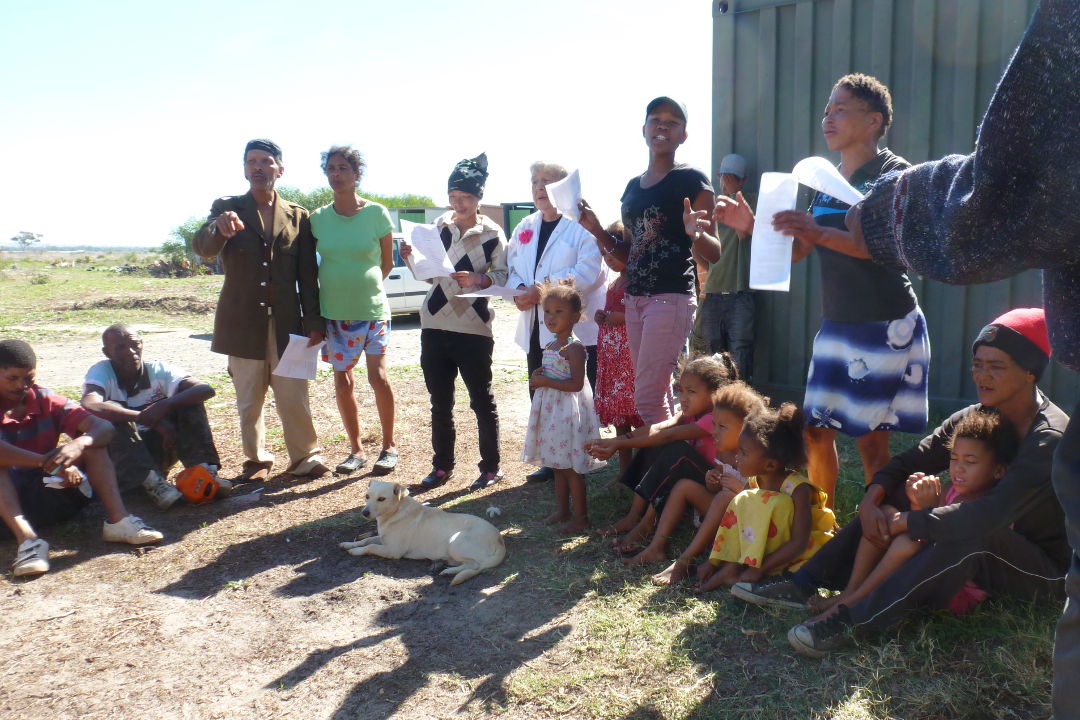In this post—the last in the series on the Richwood informal settlement—I am going to explain what the ministry meant to me, how I grew and was challenged through it, and what the future prospects are.
When I was a young boy, I developed a desire to want to teach people about the gospel and the salvation which we have in Jesus. I wrote down little "sermons" in an A3 soft cover exercise book. I never recited them to anyone, but I began to develop the inklings to one day preach to people, like the preacher did on Sundays in church. I finally got that opportunity and last year I preached my first sermon in a church. But it was not the first time I preached. I had led Bible studies before, but as for delivering a prepared message to an audience, that had begun more than a year earlier. It was not in the manner which I anticipated, but it had a greater impact on me than the "church preaching" had had.
I was first approached to join the Richwood ministry when I had proven myself to be capable of speaking in front of people1. I am also a native Afrikaans speaker, which made me perfect for taking over the teaching role in the role.
I was apprehensive at first. For one thing, I did not think myself qualified to teach other people in such a manner. For another, while I am able to speak in front of people, it is not at all what I am most comfortable in doing. But my greatest apprehension stemmed from fear: as a member of the privileged white middle class, I have had very little to do with with people in informal settlements. Poverty, to an extent, breeds crime, and as such the middle class has a fear of and disdain for people in informal settlements. Yet, ironically, South Africa relies heavily on such people for manual labour. Without them the economy would collapse. Indeed, many Apartheid laws were engineered to ensure that the country would have a long lasting and vast pool of manual labourers. And so the people working in the gardens, cleaning the homes, working in construction, moving the heavy loads etc. are all drawn from this "class" of people. They are brought into the suburbs and many middle class people would rub shoulders with them while working, but at the end of the day, each person returns to their own world.
My first apprehension was dispelled shortly after I arrived for the first outreach mission: the community was small, and the people were friendly and welcoming. We quickly got to know some of the regular attendees. Occasionally people would invite us into their homes, where they would ask for prayer. The insides of the shacks were usually neat, showing a sense of pride in what the inhabitants do have. Yet while I always tried to be politically correct and refer to their dwellings as "homes" or "houses", they were characteristically blunt, and referred to it as "hokke"; that is, cages. They were keenly aware of social standing, especially when contrasted to Burgundy Estate just across the road from them. They would dream of and aspire to more, but would ultimately remain trapped in their "cages"2.
Part of getting to know these people would be to necessarily become acquainted with their social problems. Alcoholism was rife. Drug abuse (mostly dagga—that is, marijuana) was also present3, but the alcohol abuse was the most apparent. Usually when we arrived on a Sunday morning, at least one person would be intoxicated. Sometimes they would be so much so that they become remorseful and, wracked by guilt, ask us to pray for them to be released from the grip of the alcohol. While the alcoholism in itself is a problem, it is also equally as much a symptom, as was revealed by asking a simple question the one day. We asked the residents, if they understand that the alcohol is a problem, why do they always return to drinking. They replied, almost desperately, that they drink "to forget"4. This was a huge revelation to me, and I think too many suburbians ignorantly believe that the problems begin (and would end) with drinking, all the while it is but a symptom of a massive social disorder.
When I took over the preaching responsibilities, I quickly had to learn to adapt to many trying circumstances. As I had just mentioned, there would usually be at least one person who was intoxicated, and they would usually be vocal. Sometimes women would be present who would begin to breastfeed while I was speaking, while other women would occasionally simply be scantly clad in the rags. The children who were present would sometimes make a nuisance of themselves and then the adults would proceed to discipline them right there while I was talking. There were also many animals, especially dogs, and sometimes these dogs would be between us and lash out at each other or even a passerby, which would cause a commotion amongst the people gathered there. I imagine many Old World preachers and missionaries would not at all have been impressed with such circumstances! But they all served to keep me humble and kind. I reckon I owe much to the previous two generations of school teachers in my family: I knew when to raise my voice over the distractions and keep on preaching, and when to lower my voice, all while never surrendering my opportunity to speak until I had finished what the Spirit had impressed on me to say that day.
Another interesting thing which I needed to learn was how to time myself properly. I could not afford continuing to speak for more than 5–10 minutes, whereafter the attention of those present would begin to drift (which would unsettle me far more than the drunken mumblings of someone in the back). I also needed to keep what I was saying simple, or not to assume that the people to whom I was speaking might know something I would expect the congregation in the church to know. But by far the hardest thing to accept was that I could not judge anyone there: at least not by any standard I would someone in my church. I would see the sins which trapped them, and feel helpless to do anything about it. I would also see them confess faith, and have to walk away wondering whether it was truly sincere. Ultimately it was a frustration that I could have no certainty over them: God knows their hearts and their struggles, and only He will be able to finally fairly judge whom belonged to Him all that time, and whom did not. I became aware anew of a kind of Pharisaical elitism which we as reformed Christians sometimes can tote (by which I mean that we expect people to strictly fall into our creeds, confessions and theologies). Without becoming a universalist, I need to continue in the belief that God's judgment will be more compassionate than ours would have been; at least concerning some people.
I eventually came to understand that me being involved in that ministry was as much God's plan for me to learn from these people, and their circumstances and lives, as it was for us to instruct them in the gospel. One of the joys of the ministry was to see other people realised this: during the time of my involvement with the Richwood ministry, I saw a handful of people join (and leave) the ministry: all of them going home at the end of the day with the same revelations which I had also experienced. This has led me to the belief that every Christian should, at least at some point in their lives, be involved in a mercy ministry. Additionally, remembering my initial apprehension, I came to the belief that I always need to be involved in some ministry where I am outside of my comfort zone (which, as an introvert, will admittedly never be difficult to find).
So what about the future? At this point, I do not know. We have already visited the community where they are now at Wolwerivier and the team is eager to start up the ministry again. I have been more cautious. I also want to return to them, but I have not jumped at the opportunity for the simple reason that I, at this stage, cannot say how long I can remain committed to that ministry. Currently, I am the only person available who can serve in a teaching capacity. As such, I do not want to be the one person on whom a ministry hinges and without whom it would collapse. I therefore told the other members of the ministry team that I would happily go back if there were other people who could take over my duties in the event that I can no longer participate. Their response has been enthusiastic and, therefore, encouraging. We shall see what happens in the next couple of weeks and then, by the grace of God—for everyone involved‐return.
Soli Deo gloria.
- 1. It is my theory that ours is an "introverted" denomination in the kind of people which it draws. I myself am an introvert and I supposed I would peg most of the congregants as introverts—or, at least, being over-represented than the usual one-to-one ratio of introverts to extroverts.
- 2. I do not believe that any amount of handouts or donations can truly lift them out their situation. The best hope I have for them is that their children get good educations and get stable jobs. This is why I am the most concerned about the children's education after their move to Wolwerivier.
- 3. I recall on one occasion encountering a distraught mother who decried her son's drug addiction: he had taken to stealing the little possessions they have and which she earns to support his drug addiction.
- 4. Later, to my astonishment, I would learn from friends of mine—also white middle class—that that was the same reason why they would get drunk. It opened my eyes to the fact that, although the social divide is massive, ultimately we are all human and we all have to deal with problems, fears, insecurities and neglect.









Latest comments